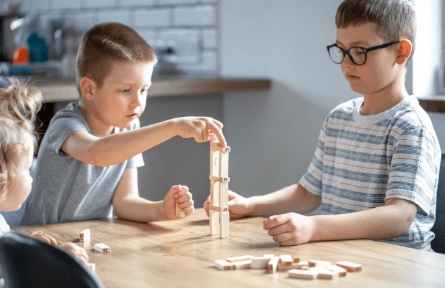
Welcome, knowledge seekers! Today, we have the privilege of interviewing Ms. Veronica Wright, a seasoned educator with a treasure trove of experience and wisdom. Ms. Wright has navigated countless classrooms, witnessed a multitude of student “aha!” moments, and emerged with a wealth of lessons learned. Let’s delve into her world and glean some pearls of educational wisdom!
Question: You’ve witnessed countless student successes over the years. Can you share a specific moment that stands out and why?
Ms. Wright: Absolutely! One student, Sarah, comes to mind. She struggled with reading fluency for years. We tried various strategies – phonics programs, audiobooks, even one-on-one reading sessions. While she improved, her confidence remained low. Textbooks felt like an insurmountable wall, and the joy of reading seemed like a distant dream. Then, during a library visit, Sarah stumbled upon a graphic novel series about a young scientist on a thrilling quest to discover a hidden rainforest ecosystem. The vibrant illustrations, the fast-paced plot, and the relatable young protagonist captivated her. Suddenly, reading wasn’t a chore; it was an adventure! She devoured those books, her enthusiasm for reading soaring with each page. Seeing the joy of discovery ignite in her eyes, witnessing that transformation from struggle to pure, unadulterated reading pleasure – that’s a moment I’ll never forget. It taught me the power of finding the right spark to ignite a passion for learning. It’s not a one-size-fits-all approach. Sometimes, all it takes is the right book, the right topic, to unlock a world of possibilities for a student.
Question: How do you translate those “aha!” moments into lasting learning experiences?
Ms. Wright: Capitalizing on those moments is crucial. After Sarah’s breakthrough with the graphic novels, we explored other science-themed books, building on her newfound confidence. We delved into biographies of real-life scientists, explored non-fiction texts about different ecosystems, and even watched documentaries about rainforests. We even invited a local scientist to speak to the class, further igniting her curiosity about the natural world. It’s about nurturing that initial spark and providing opportunities to delve deeper, to explore the vast and fascinating world that the “aha!” moment has opened up for them.
Question: What about your own successes as an educator? What lessons have you learned from them?
Ms. Wright: One valuable lesson came from a complete overhaul of my classroom management strategy. Early in my career, I relied on a strict, top-down approach. While it maintained order, it stifled creativity and student autonomy. The classroom felt less like a collaborative learning environment and more like a drill sergeant’s training ground. I yearned for a space where students felt empowered to explore, to ask questions, and to be active participants in their own learning journeys. So, I implemented a more collaborative approach, incorporating student input into classroom rules and procedures. This fostered a sense of ownership in the classroom. Students thrived on the responsibility, and the learning environment became more engaging for everyone. This wasn’t just about changing a few rules; it was about a fundamental shift in my teaching philosophy. It taught me the importance of flexibility and adapting to student needs. Every classroom is unique, and the best management strategies are the ones that empower students to take ownership of their learning.
Question: We all face challenges. How do you bounce back from setbacks and keep celebrating successes?
Ms. Wright: Setbacks are inevitable in the teaching profession, just like in life. But they’re also opportunities to learn and grow. After a particularly challenging lesson, where I felt like nothing went according to plan, I reflected on what went wrong. Sometimes, the “success” lies in identifying areas for improvement. Did the lesson plan need to be tweaked? Were the activities engaging enough? By asking these questions and actively seeking solutions, I transformed the setback into a stepping stone. Celebrating small victories, like a student overcoming a specific challenge they’d been grappling with, keeps me motivated and fosters a growth mindset in myself and my students. We learn together, we celebrate together, and we keep moving forward.
Question: How can parents or guardians support their children’s educational triumphs, big or small?
Ms. Wright: Absolutely! The support system at home is crucial for a student’s success. Parents or guardians can play a vital role in celebrating their children’s educational achievements, big or small. A simple “Wow, I can’t believe you aced that spelling test!” or “You worked so hard on that science project, it looks amazing!” can work wonders. It shows your child that you value their efforts and achievements. Recognition and encouragement go a long way in boosting their confidence and motivation.
Here are some additional ways parents or guardians can support their children’s educational triumphs:
Connect Classroom Successes to Real-World Applications: Did your child excel in a unit on measurement? Bake cookies together and have them measure out the ingredients! This reinforces the practical applications of what they’re learning in school and makes learning more relevant and engaging.
Create a Celebration Ritual: Maybe it’s enjoying a special dessert after a good report card or having a movie night after completing a challenging project. Creating a positive association with learning and achievement makes the journey more enjoyable.
Focus on the Effort: It’s not always about the A+ on the test. Acknowledge the hard work and dedication your child put in to achieve a goal. This fosters a love of learning that goes beyond grades and external validation.
Question: What advice would you give to aspiring educators feeling overwhelmed by the pressure to succeed?
Ms. Wright: Teaching is a marathon, not a sprint. There will be days that feel overwhelming, and that’s perfectly okay. Focus on the journey of learning and growth, not just the destination. Celebrate small wins, both yours and your students’. Did a student finally grasp a concept they’d been struggling with? High five that victory! Did you master a new technology platform that will enhance your lessons? Treat yourself to a cup of coffee and celebrate your accomplishment!
Here are some additional tips for aspiring educators feeling overwhelmed:
Don’t Be Afraid to Ask for Help: Teaching is a collaborative profession. Lean on your colleagues, mentors, or even online communities for support and advice. There’s no shame in admitting you need help, and the support network you build can be invaluable.
Maintain a Work-Life Balance: Burnout is a real threat. Schedule time for self-care activities that reduce stress and replenish your energy. A well-rested, rejuvenated educator is a more effective educator.
Remember Why You Started: Reflect on what initially drew you to the teaching profession. Was it the desire to make a positive impact on young lives? The joy of fostering a love of learning? Reconnecting with your “why” can reignite your passion and help you persevere through challenges.
Question: Let’s talk creativity! Share some unique ways you’ve celebrated successes in your classroom.
Ms. Wright: Absolutely! Celebrating successes shouldn’t be a monotonous routine. Here are some creative ways I’ve infused fun and excitement into recognizing student achievements:
Themed Movie Marathons: After completing a unit on ancient civilizations, we transformed the classroom into a mini-coliseum (complete with toga-clad students!) and had a Roman history movie marathon. This not only celebrated their learning but also allowed them to immerse themselves in the culture they had been studying.
Student-Led Presentations: For science projects, we ditched the traditional science fair format and opted for student-led presentations. Students presented their findings to their classmates, fostering a sense of ownership and public speaking skills.
“Caught You Being Awesome” Notes: I keep a stash of colorful sticky notes handy. Whenever I catch a student demonstrating a positive behavior, like perseverance, collaboration, or going the extra mile to help a classmate, I leave them a personalized “Caught You Being Awesome” note. It’s a small gesture, but it brightens their day and reinforces positive behaviors.
Question: Social media can be a double-edged sword. How can educators leverage it to celebrate successes responsibly?
Ms. Wright: Social media can be a fantastic tool for celebrating student success and fostering a sense of community. With parental permission, I share student artwork or project highlights on the school’s social media platforms. This showcases their achievements to the wider community and can even inspire other students. However, it’s important to maintain student privacy and focus on celebrating their work, not individual students themselves. Here are some additional tips for responsible social media use:
Focus on the Collective Effort: Instead of singling out individual students, celebrate the achievements of the entire class. For example, you could post a picture of a collaborative classroom project or a group of students engaged in a lively discussion.
Get Creative with Anonymity: Blur student faces in photos or use nicknames with parental permission. You can also celebrate achievements by focusing on the work itself, like a particularly well-written essay or a stunning science experiment.
Post with Purpose: Don’t just broadcast achievements. Use social media to spark conversations about learning. Pose questions about student projects, encouraging interaction and fostering a love of learning within the online community.
Question: Looking back on your career, what’s the most valuable lesson you’ve learned?
Ms. Wright: The most valuable lesson I’ve learned is the power of relationships. Building strong connections with students, parents, and colleagues creates a supportive learning environment where everyone feels valued and empowered to succeed. When students know you care about them as individuals, they’re more likely to take risks, ask questions, and embrace challenges. The same goes for collaboration with parents and colleagues. By working together, sharing resources, and celebrating successes as a team, we create a powerful network that benefits everyone involved. Teaching is not a solo act; it’s a collaborative journey, and the strength of the relationships we build is what makes it truly rewarding.
Question: Any final words of wisdom for our readers?
Ms. Wright: Teaching is a noble profession, filled with challenges and triumphs. Celebrate the victories, big and small, and never stop learning and growing alongside your students. Remember, fostering a love of learning is the most rewarding success of all. It’s about igniting a spark of curiosity, nurturing a passion for exploration, and empowering students to become lifelong learners. That’s the true magic of teaching, and it’s a journey worth celebrating every step of the way!
Bonus: Ms. Wright’s Celebration Toolkit!
Inspired by Ms. Wright’s insightful responses, you might be eager to implement creative celebrations in your own classroom. Here’s a bonus toolkit to get you started:
Low-Prep Celebrations:
“Awesome Octopus”: Craft a paper octopus with eight tentacles, each labeled with a positive quality like “perseverance,” “creativity,” or “teamwork.” Throughout the week, catch students exhibiting these qualities and write their names on a tentacle. By the end of the week, you have a classroom octopus showcasing student awesomeness!
“Compliment Chain”: Start by writing a compliment on a strip of paper for a student. Have them add their own compliment to another student on the back, and so on. This creates a heartwarming chain of positivity that celebrates everyone in the class.
“Mystery Motivators”: Hide positive affirmations or mini-challenges around the classroom. Students can discover them throughout the day, adding a touch of surprise and motivation to their learning.
Themed Celebrations:
“Around the World Day”: After a unit on geography, transform your classroom into a mini-world fair. Students can showcase their chosen countries through presentations, cultural displays, or even traditional snacks.
“Backwards Book Club”: Celebrate finishing a challenging book by having a “backwards book club.” Students can discuss their favorite moments, most surprising plot twists, and key takeaways, all while working their way back to the beginning of the book.
“Math Mystery Night”: Turn your classroom into a detective agency for a math mystery night. Students can work together to solve math-based puzzles and “crack the case,” celebrating their problem-solving skills with a themed treat.
Remember: The most effective celebrations are those that resonate with your students and learning environment. Don’t be afraid to get creative, personalize these ideas, and most importantly, have fun celebrating the joy of learning together!









